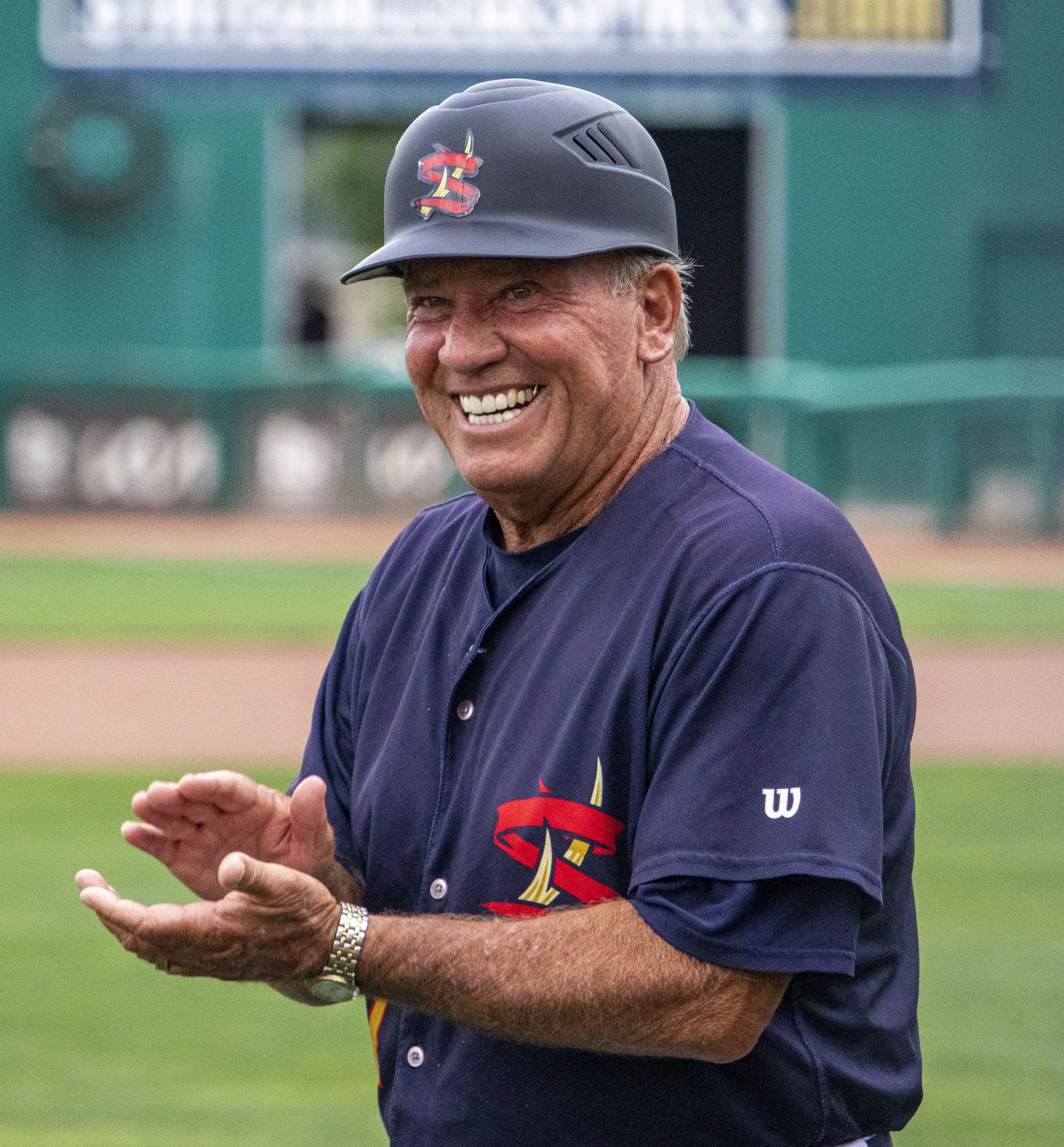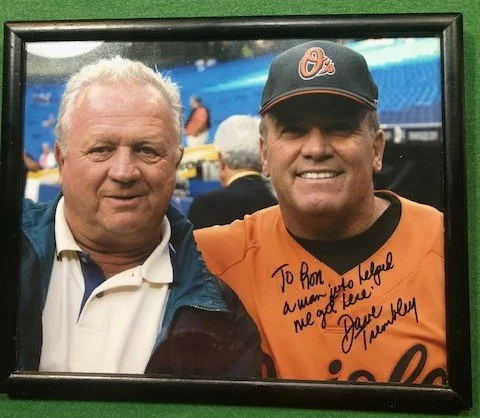Kennedy: Longtime manager Trembley still applying lessons learned in Kingston
Former Baltimore Orioles manager and Kingston Ponies C Dave Trembley is now managing the State College Spikes of the Major League Baseball Draft League. Photo: Regan Gross/State College Spikes.
June 11, 2023
By Patrick Kennedy
Canadian Baseball Network
When last we saw Dave Trembley, the former Baltimore Orioles manager and onetime catcher with the Kingston senPonies was holding court in a swanky Toronto lounge of the Westin Hotel.
The occasion was a small private party attended by Trembley and ex-senior players SS Ron Earl, 2B Bob Gilmour and the late 1B Guy White. Your humble scribe was also there, having accompanied that local trio on the 2009 trip to Rogers Centre to glean added column material and in case bail needed to be posted later in the evening.
I’m kidding of course. The only things locked away on that night at the Orioles downtown hotel were big-league tales and tidbits, 13 to a dozen, disclosed by Trembley and permanently etched into the memories of his rapt listeners. The amiable native of Carthage, N.Y., revelled in the company of old teammates from that influential summer in the Limestone City, delighted to once again respond to the nickname of “Maesal” after Kingston crooner Maesal Tremblay, who owned Tremblay’s Music.
“There are times you experience in your life that leave a lasting impact even if you don’t realize it at the time,” Trembley recalled recently over the phone from Pennsylvania, where the 71-year-old baseball lifer and ardent traditionalist is now managing the State College Spikes of the Major League Baseball Draft League. “My time in Kingston, my teammates, our manager – it all had a long-lasting impact on my life.”
He credited long-time Kingston manager Gerry “Doc” Wagar for illustrating to him the “importance of being patient, particularly with first-year players.”
Decades later, when at age 55 Trembley was hired as manager of an Orioles team (2008-2010) that included promising young players such as Nick Markakis, Adam Jones and rookie Matt Wieters, the new skipper showed the same Wagar-like tolerance. Ditto for his years with the Atlanta Braves and Houston Astros when he helped groom young future stars such as Freddie Freeman, Ozzie Albies, Jose Altuve, Dallas Keuchel and George Springer. Patience is a virtue, and Trembley has it in spades.
“Another thing I learned from Doc was the importance of keeping the same demeanor day in, day out, no matter how your team is playing,” added Trembley, who was lured to Kingston that summer when his Cathage team folded following the 1973 campaign. “I’d never had that kind of personal interaction with a manager. And that level demeanor didn’t mean Doc wasn’t competitive. He was. But he stayed on even keel, which I later learned is very important for young players to see. Whether that Kingston club won or not, the next day Doc would be the same calm, supportive manager.”
Trembley is a throwback, an old-school diehard who’s still working in a sport now consumed with advanced metrics and analytics and such esoteric measures as LA (Launch Angle), EV (Exit Velocity) BABIP (Batting Average on Balls In Play) wRC+ (weighted Runs Created Plus) and the ever-popular OPS (On-base Plus Slugging), which seems to have replaced the once-requisite Batting Average when a batter’s mug flashes on the Jumbotron at the Toronto Blue Jays domed playhouse. The game has changed and not for the better, in the mind of the baseball purist. Mention IR-A% (Inherited Runs Allowed Percentage) and you can almost hear an old workhorse like Warren Spahn spinning in his grave. (Ol’ “Hooks” tended to finish what he started, compiling a staggering 382 complete games in his Hall of Fame career. Put into perspective, MLB’s current active leader in complete games is 17-year veteran Justin Verlander with 26. Spahn had that many in 1951 alone.)
Managing in the MLB Draft League - a developmental six-team loop with a split-season amateur-pro format – is right in Trembley’s teaching wheelhouse, so to speak. Prior to joining the Spikes last season, he served as the manager for the Bristol State Liners of the Appalachian League in 2021, reconnecting him with the development of young players in Major League Baseball's Player Development Pipeline.
Previously, Trembley held the dual roles as director of player development and minor league field coordinator for the Atlanta Braves from 2014-18, preceded by two years as a coach for the Houston Astros. He’s also worked in the farm systems of three other teams. He’s managed teams in eight states, one province and five countries, including winter-ball assignments in Venezuela, Mexico and the Dominican Republic.
“I’ve eaten a ton of peanut butter and jelly sandwiches and rode a lot of buses,” he said, laughing.
Such is life in the minor leagues.
After his stint with the Braves, he retired only to return a year later when offered him the Bristol position. He accepted under two conditions: a/ he wanted a team with “high-quality young men” and b/ he wanted to teach “old-school baseball” with strong emphasis on fundamentals.
“I’m not big on analytics and computers,” Trembley admitted. “I didn’t want kids who were interested in spin rate, launch angle and all that stuff. My job was to develop a sound work ethic and an attitude of team first, not individual first. You must first learn to play the game before you even start thinking about (analytics), and you learn by leaning on good people around you. That’s what I did in Kingston.
“Duke Murphy (Brockville, Ont.) was probably the best pitcher I ever caught,” he continued, recalling the crafty Ponies southpaw. “Man could that guy paint the corners, and Ronnie Earl is still one of the best contact hitters I’ve seen, choking up with two strikes and slapping hits all over the field. Camel (Clyde) Harris could play every position. Guy White knocked in runs when you needed them. That’s how baseball used to be. Heck, I’ve got guys on my team now who’ve never even bunted! Ever!”
Former Kingston Ponies senior teammates Ron Earl, left, and Dave Trembley at a 2009 Baltimore Orioles-Blue Jays game. Trembley was managing the Orioles at the time. Photo by Fred “Tex” Rose
Trembley feels baseball’s approach changed years ago after seasoned coaches either retired or were pushed out by the disciples of analytics.
“The game lost so many good teachers, guys who stressed fundamentals first,” he said. Disillusioned by the move to sabermetrics, he walked away.
Which begs the question: Why did he, already pushing 70, turn his back on a comfortable retirement in Florida and slip back into a baseball uniform?
For one thing, he’s nuts about baseball, always has been.
“I didn’t need the money and I don’t play golf, but I love baseball and I care about the young men who want to play it for a living,” said Trembley. “I throw BP to these guys, hit fungoes, run with them. I’m on the field with them at 1:30 for a 6:30 game.
“I want to help young players the same way those guys in Kingston helped me so long ago. I learned so much from older guys like Duke Murphy, Squirrel Earl, Doc Wagar and others on that Kingston team. I saw the passion and commitment they had for the game and their desire to see it played the right way. They were good people who influenced me in so many ways.”
Patrick Kennedy is a retired Whig-Standard reporter. He can be reached at pjckennedy35@gmail.com


